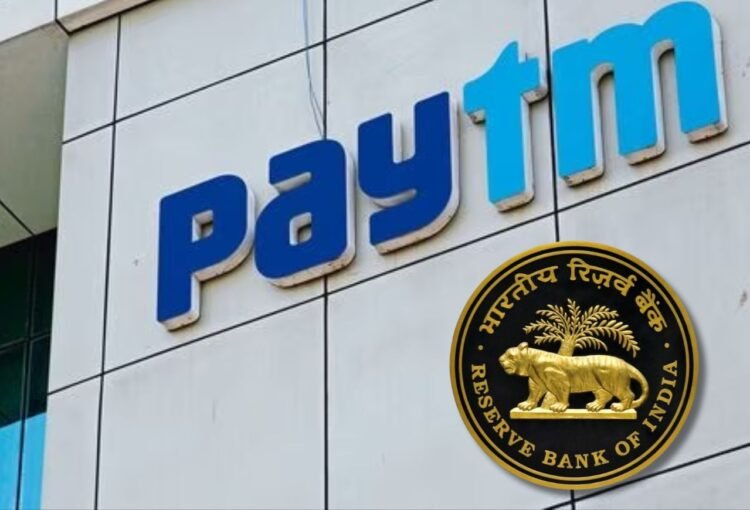In a recent move that has sent shockwaves through India’s fintech landscape, the Reserve Bank of India (RBI) has taken decisive action against Paytm Payments Bank. Once hailed as the poster child of India’s digital revolution, Paytm now faces significant challenges due to the central bank’s intervention. Let’s break down the controversy and understand its implications.
Why Did the RBI Act?
The RBI’s action stems from persistent non-compliances and material supervisory concerns related to Paytm Payments Bank. While the central bank did not explicitly state the reasons, experts believe the following issues played a role:
1. KYC Compliance
- The RBI has been scrutinizing Paytm since 2018, particularly regarding Know Your Customer (KYC) compliance.
- Ensuring proper identification and verification of customers is crucial for financial institutions, and any lapses can raise red flags.
2. IT-Related Issues
- Paytm’s servers were found to share information with China-based entities, which indirectly hold a stake in the bank.
- Data flowing to overseas servers violated Indian rules and raised concerns about security and transparency.
What Does the RBI Order Mean?
The RBI’s directive, effective from February 29, 2024, restricts Paytm Payments Bank in several ways:
1. Service Limitations
- Paytm can no longer offer key services, including accepting deposits, prepaid instruments, wallets, FASTags, and the National Common Mobility Card (NCMC).
- Fund transfers (such as AEPS, IMPS, etc.) will also cease after this date.
2. Nodal Account Termination
- The nodal accounts of Paytm’s parent company, One97 Communications, and Paytm Payments Services must be terminated by February 29.
- All pipeline transactions initiated before February 29 must be settled by March 15.
3. Customer Balances
- Customers can still withdraw or utilize their balances from Paytm accounts, including savings and current accounts, prepaid instruments, FASTags, and NCMC.
- The RBI ensures that customers can access their available balances without restrictions.
Impact on Paytm and Customers
With over 100 million KYC-verified customers and millions of FASTag users, Paytm’s operations will be significantly affected.
Founder Vijay Shekhar Sharma, who also chairs the bank, faces a challenging road ahead.
In summary, the RBI’s action against Paytm underscores the importance of regulatory compliance and transparency in the financial sector. As the dust settles, the fate of India’s once-revolutionary fintech giant hangs in the balance.
***
Who are the China-based entities that hold a stake in Paytm?
China’s Ant Financial, an affiliate of Alibaba Group Holding Ltd., holds a significant stake in Paytm.
Let’s delve into the details:
- Ant Financial initially held around 24% of Paytm’s shares.
- However, in a strategic move, Paytm founder and CEO Vijay Shekhar Sharma orchestrated a complex deal.
- Through this deal, Ant Financial’s shareholding was reduced by 10.3%.
- The shares held by Antfin (Netherlands) Holding BV were then transferred to Resilient Asset Management, another Netherlands-based entity wholly owned by Sharma.
- As a result, Ant Financial’s stake in Paytm dropped to approximately 13%.
- The transaction involved issuing optionally convertible debentures (OCDs) to Ant Financial.
- Importantly, since both entities are registered in the Netherlands, the deal had no tax implications in India.
- This move allowed Vijay Shekhar Sharma to gain more control over Paytm and streamline the company’s cap table.
- Notably, in February, Alibaba (Ant Financial’s parent entity) sold its remaining 3% stake in Paytm through an open market deal.
- The ongoing controversy highlights the importance of regulatory compliance and transparency in India’s fintech landscape.
***
How will this affect Paytm’s operations in China?
The recent Reserve Bank of India (RBI) action against Paytm Payments Bank primarily impacts its operations within India, not specifically in China. However, let’s delve into the details:
Indian Operations:
The RBI has barred Paytm Payments Bank from offering several key services, including accepting deposits, prepaid instruments, wallets, FASTags, and the National Common Mobility Card (NCMC) after February 29, 2024.
- Fund transfers (such as AEPS, IMPS, etc.) will also cease after this date.
- The nodal accounts of Paytm’s parent company, One97 Communications, and Paytm Payments Services must be terminated by February 29.
- All pipeline transactions initiated before February 29 must be settled by March 15.
- Customers can still withdraw or utilize their balances from Paytm accounts without restrictions.
China Connection:
Paytm’s association with China-based entities has been a point of concern.
Ant Financial, an affiliate of Alibaba Group Holding Ltd., holds a significant stake in Paytm.
While Paytm was founded and developed in India by Indian developers, its financial ties with Chinese entities have raised eyebrows.
The ongoing controversy highlights the importance of regulatory compliance and transparency in India’s fintech landscape.
In summary, the RBI’s action primarily affects Paytm’s Indian operations, but the China connection remains a factor that could impact its future endeavors.
***
What is the future of Paytm?
The future of Paytm hangs in a precarious balance, akin to a tightrope walker swaying between success and uncertainty. Let’s peer into the crystal ball and explore potential scenarios:
Recovery and Reinvention:
- Paytm has weathered storms before. It could bounce back by reevaluating its business model, enhancing compliance measures, and rebuilding trust.
- The company might diversify beyond payments and delve into other financial services or e-commerce segments.
- Vijay Shekhar Sharma, the visionary behind Paytm, could lead a strategic overhaul.
Challenges Ahead:
The RBI’s restrictions will significantly impact Paytm’s operations. The loss of key services and the nodal account termination pose formidable challenges.
The company must navigate these hurdles while retaining customer confidence.
Competition and Survival:
India’s fintech landscape is fiercely competitive. Rivals like PhonePe, Google Pay, and Amazon Pay are vying for dominance.
Paytm must innovate, offer superior user experiences, and regain lost ground.
Global Expansion:
Despite domestic setbacks, Paytm could explore international markets. Its existing user base and technology stack provide a springboard.
Southeast Asia, Africa, or the Middle East might beckon.
Regulatory Compliance:
Paytm’s future hinges on adhering to regulations. Stricter compliance and transparency are non-negotiable.
The company must address concerns related to data security, KYC norms, and overseas ties.
Investor Sentiment:
Investors closely monitor Paytm’s trajectory. Their confidence will shape the company’s destiny.
Funding rounds, partnerships, and strategic alliances will play pivotal roles.
User Loyalty:
Paytm’s loyal user base remains its lifeline. Retaining trust and offering value-added services are paramount.
The fate of millions of digital wallets rests on Paytm’s decisions.
In this high-stakes drama, Paytm’s survival depends on agility, resilience, and strategic acumen. Only time will reveal whether it emerges as a phoenix or succumbs to the tempest.
***
How has Paytm impacted India’s economy?
Paytm, as a dominant e-commerce entity in India, has dramatically transformed how individuals transact for products and services. It has brought about a major shift in the Indian economy by making it easier for entrepreneurs to start their own businesses1. Let’s delve into the impact of Paytm on India’s economic landscape:
Digital Payments Revolution:
- Paytm pioneered digital payments in India. Its mobile wallet and payment app revolutionized the way people pay for goods and services.
- By promoting cashless transactions, Paytm contributed to reducing the dependence on physical currency.
- Millions of small businesses, street vendors, and service providers adopted Paytm as a convenient payment solution.
Financial Inclusion:
- Paytm played a crucial role in India’s financial inclusion drive.
- It provided access to banking services for the unbanked population, allowing them to save, transfer money, and pay bills through their smartphones.
- Rural areas saw increased participation in the formal financial system due to Paytm’s reach.
Boosting Entrepreneurship:
- Paytm’s platform empowered entrepreneurs and small businesses.
- It facilitated online transactions, enabling startups and local businesses to reach a wider customer base.
- The ease of accepting payments via Paytm QR codes encouraged micro-entrepreneurs to embrace digital commerce.
Job Creation:
- As Paytm expanded, it created employment opportunities across various sectors.
- From customer support to technology development, Paytm’s growth led to job openings in diverse fields.
Economic Digitization:
- Paytm’s success spurred other digital payment platforms, contributing to India’s economic digitization.
- The Unified Payment Interface (UPI), where Paytm is a major player, witnessed exponential growth.
- UPI transactions saved the Indian economy approximately $67 billion since its inception in April 2016.
Investment and Fintech Ecosystem:
- Paytm attracted significant investments from global players like SoftBank.
- Its success inspired other fintech startups, leading to a vibrant ecosystem.
- The government’s push for digital payments aligned with Paytm’s mission.
Challenges and Controversies:
The recent RBI crackdown on Paytm has raised concerns about the fintech sector.
India’s MakeMyTrip and PolicyBazaar have warned that this decision could harm investment, discourage innovation, and send a negative signal to the global business community3.
Paytm’s future hangs in the balance, but its impact on India’s economy remains undeniable.
In summary, Paytm’s journey from startup to fintech giant has left an indelible mark on India’s economic landscape, transforming the way people transact and empowering millions.
***
Who are some other major players in India’s fintech landscape?
India’s fintech landscape is vibrant and dynamic, with several major players shaping the industry. Here are some prominent names:
- Paytm: Once a digital wallet, Paytm has evolved into a comprehensive financial services platform, offering payments, banking, and more.
- Razorpay: Known for its robust payment gateway solutions, Razorpay empowers businesses to accept online payments seamlessly.
- Pine Labs: Pine Labs specializes in point-of-sale (POS) solutions, enabling retailers to manage transactions efficiently.
- Groww: A popular investment platform, Groww simplifies mutual fund investments and stock trading for retail investors.
- BharatPe: Focused on merchant payments, BharatPe provides QR-based payment solutions to small businesses.
- Policy Bazaar: As an online insurance aggregator, Policy Bazaar helps users compare and purchase insurance policies.
- CRED: CRED rewards credit card users for timely bill payments and offers exclusive perks.
These companies have significantly impacted India’s financial landscape, driving innovation, inclusion, and digital adoption.
***
What is the future of India’s fintech industry?
The future of India’s fintech industry is bright and promising. Let’s explore the potential trends and developments:
Digital Transformation:
- Fintech companies will continue to drive digital adoption across various financial services.
- Mobile banking, digital wallets, and contactless payments will become even more prevalent.
- Open banking initiatives will enhance collaboration between banks and fintech players.
Financial Inclusion:
- Fintech will play a pivotal role in bringing the unbanked and underbanked population into the formal financial system.
- Microfinance, peer-to-peer lending, and small-ticket insurance will expand.
Lending Innovations:
- Alternative lending platforms will disrupt traditional lending models.
- Personal loans, business loans, and consumer credit will be more accessible and customized.
Blockchain and Cryptocurrencies:
- India’s stance on cryptocurrencies remains uncertain, but blockchain technology will find applications beyond crypto.
- Smart contracts, supply chain management, and secure data sharing will gain traction.
Wealth Management:
- Robo-advisors and automated investment platforms will democratize wealth management.
- Retail investors will have personalized investment strategies.
Insurtech:
- Digital insurance platforms will simplify policy purchase, claims processing, and risk assessment.
- Healthtech insurance will address evolving healthcare needs.
Regulatory Framework:
- Clearer regulations will foster innovation while ensuring consumer protection.
- The government’s role in shaping the fintech ecosystem will be crucial.
AI and Data Analytics:
- Fintech companies will leverage artificial intelligence for better risk assessment, fraud detection, and customer insights.
- Big data analytics will drive personalized financial products.
Payments Infrastructure:
- UPI, BHIM, and other real-time payment systems will continue to evolve.
- QR code payments will become ubiquitous.
Collaboration and Partnerships:
- Fintech startups will collaborate with traditional banks, NBFCs, and other players.
- API banking will enable seamless integration.
In summary, India’s fintech industry will witness innovation, disruption, and increased financial inclusion. As technology evolves, the sector’s growth trajectory remains exciting and full of opportunities.






















